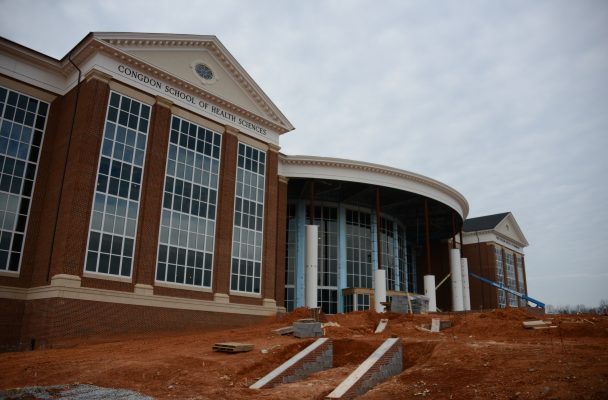School of Health Sciences and School of Pharmacy construction update

Photo by James Ensor
By James Ensor// Editor in Chief
On Sept. 9, 2015, High Point University broke ground on the Congdon School of Health Sciences and the Fred Wilson School of Pharmacy. Construction on the 220,000-square-foot building will be completed the second week of May, nearly 20 months after construction started.
“It’s a big building,” said HPU President Dr. Nido Qubein. “It is an extraordinary facility with state of the art labs and resources and spacious common areas for dialogue and discovery.”
At any given time there are 120 construction workers on-site. With nearly 3 months of construction left on the building, construction runs 16 hours a day.
The soon-to-be-finished facility will be home to both the Congdon School of Health Sciences and the Fred Wilson School of Pharmacy.
“With awareness that America has an expanding aging population and the need for more health care, HPU embarked on establishing these two new schools for Pharmacy and Health Sciences,” Qubein said.
In total, 80 faculty and staff positions will be added, in addition to 500 new students once the programs reach maximum capacity.
“This project is significant because of the graduate programs it will help develop,” said Steve Potter, vice president for facilities and auxiliary operations.
The building will include advanced biomedical research labs, a cadaver lab, standardized client space, medical simulation labs, and a mock pharmacy.
“Everything is based on the needs of the various disciplines,” Potter said.
The building will have 10 classrooms and 20 labs for students to utilize. Additionally, there will be 80 faculty offices.
“The pharmacy, physical therapy, and physician assistant programs are attracting a high level of interest,” Qubein said. “Collectively, some 3,000 applicants from 34 states.”
Overall, the building will allow HPU to expand its graduate-level programs.
“For the university itself, these programs heighten our position as an undergraduate and graduate institution with a focus on liberal arts and a concentration on professional programs as well,” Qubein said.
The investment totals $120 million, which includes construction fees and program startup fees.
“These programs will create opportunities for our undergraduate students to enroll in graduate programs,” Qubein said. “Students will benefit from the extensive offerings of lectures and collaborative research. Students will be exposed to some of the finest faculty from across the country.”